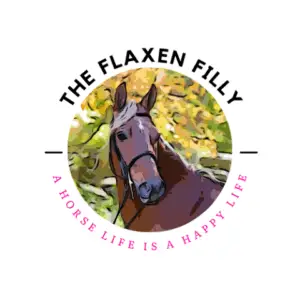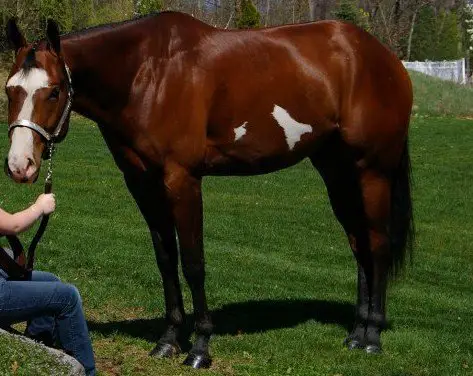The ultimate goal for most horse lovers is to own your very own horse. If you’re considering buying your first horse, here’s what you need to know.
Defining Your Wants, Needs & Must Haves
Once you and your trainer agree that you are ready to purchase your first horse, start by listing the qualities that are important to you.
If you don’t have a trainer, check out this article on finding a riding instructor!
List out your Wants, Needs and absolute Non-negotiable Must-haves! Here are some examples.
Wants may include; color, show record, breeding, enjoys trail riding, no vices such as cribbing, easy to load on a horse trailer
Needs may include; height, breed, ability to be handled by children, age, certain level of training or ability to perform well in a specific discipline
Must haves may include; good ground manners, safe to ride, not spooky, good natured.
Determining Your Budget
We consulted trainer Brooke Waldron from Stepping Stone Ranch on how to determine the budget for your first horse.
Brooke’s Advice
The market on horses changes and varies not only to reflect a horse’s talents, disposition, and training but there is some variation on prices depending on where you live!
If your “want” list is long, and you have some non-negotiable qualities listed, you likely will need to widen your search. You may need to be willing to travel to find your match.
You’ll also want to be realistic with your budget, your trainer can provide solid advice on what that price tag might look like.
I generally place needs before wants, for example, if a client wants a flashy color horse, but I find the perfect match for them that might not match their color choice, I will suggest they negotiate on that quality.
Horses can live for 30 years, most people want a long term committed relationship, and to do that- you really need to find your true horse match, safety should be the priority!
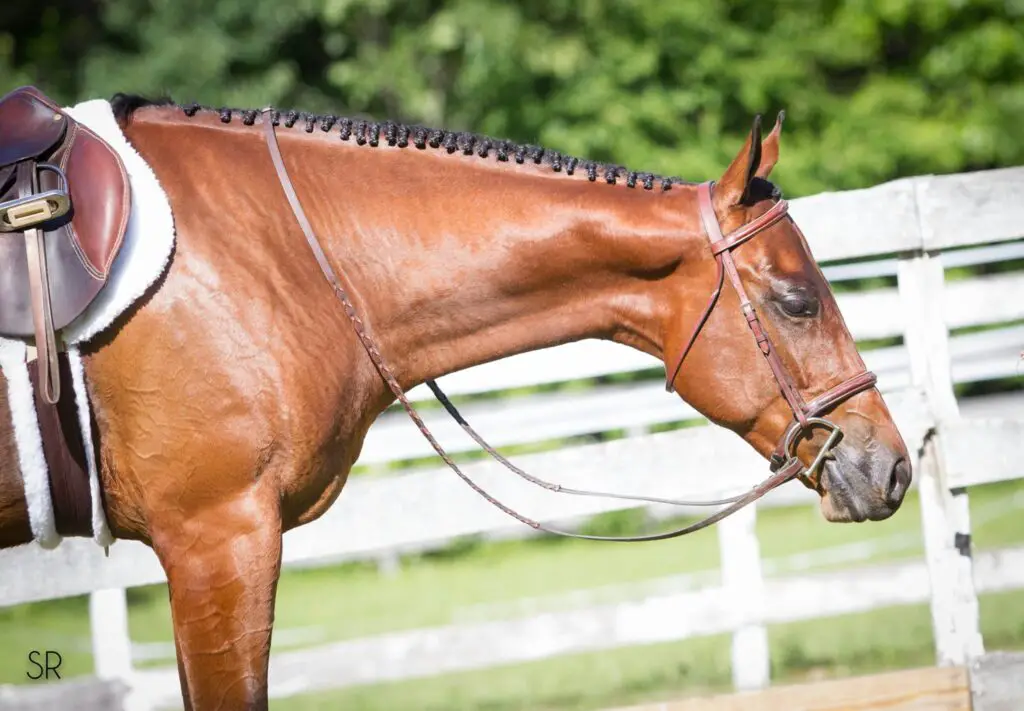
Finding Prospects
Where To Look
Sites like dreamhorse.com, equinesite.com, equine.com and equinenow.com are good places to start. You can also look on Facebook by searching for horse for sale groups. There are lots of different groups that vary by discipline, price range etc.
Watch videos
In this day and age, you can save yourself a lot of time and money by previewing videos of horses before making travel arrangements to view the horse in person.
While videos don’t tell the whole story, they will give you a good idea how the horse moves and interacts with people.
When buying your first horse, it’s a good idea to have your trainer watch videos of horses you are interested in.
Making sure you and your trainer are aligned on goals, preferences and needs will help make the process more seamless. Plus, chances are, they’ve been around the block and can pick up on less obvious details and shield you from a potential disaster.
Make Inquiries
When looking for horses, many of the ads will sound great and you may think you’ve found the perfect match. But, don’t get too excited yet! Follow the steps below to better your chances of finding the right partner!
Be up front about your riding ability and comfort level.
Often times, the current owner loves their horse or you’ll be dealing with a broker who cares about the success of the partnership and their reputation and they will be honest.
It is important to be honest about your riding ability too.
If the seller feels you are not a good match for the horse, they should be up front and let you know that ahead of time.
Ultimately, you want to buy a horse that is suitable for your ability level, safe for you to handle and has a personality that you can bond with.
Questions To Ask Before Buying Your First Horse
After you’ve watched videos of various horses and reviewed the details in their ads you’ll want to contact the seller to ask any remaining questions you have.
Background and Experience
Depending on your interests, discipline and future goals, find out if the horse has relevant experience.
Does the horse have a show record or trail riding experience? How long has the current owner had the horse and what have they done during their time together?
Health and Maintenance
Be sure to ask about prior health related issues, not because it will prevent you from buying the horse. But, being prepared will allow you to give the horse the best possible care.
For example, if the horse has previously had ulcers or has a mild soundness issue that can be managed, you’ll want to know.
Does the horse require special shoeing, medications, supplements?
Potential
What type of riding does the horse enjoy most?
Does the horse show the potential to be used in different disciplines? Do they have the potential to excel in their current discipline?
What type of training or support from a professional trainer will the horse need in order to be suitable for you as a rider?
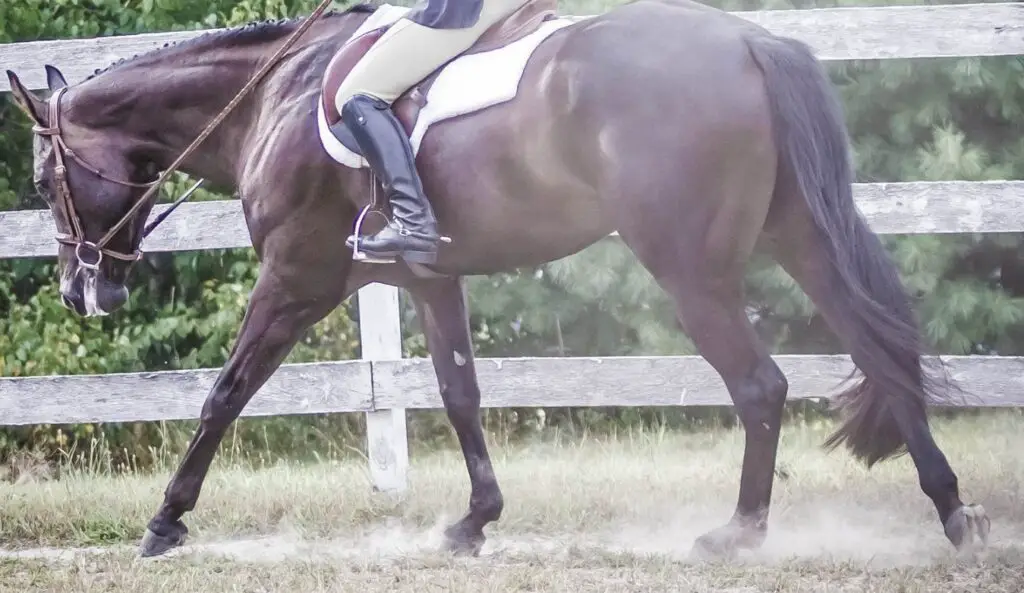
Trying The Horse
Bring Your Trainer
I can’t stress this enough, and most experienced horse owners and professionals will agree. When trying prospective horses, bring your trainer with you!
It may cost you in travel fees and/or commission but it will be well worth it in the long run. Your trainer can prevent you from experiencing one of the horror stories we’ve all heard and a great amount of heartache and financial pain.
They will pick up on behaviors and potential soundness issues that novice buyers may not notice. Your trainer will observe how the owner or seller interacts with the horse, and ask the right questions based on their observations.
Lastly, they will also be able to ride the horse and analyze concerns and potential.
Watch The Seller Ride The Horse
Watching the seller ride the horse is important. You want to see how the horse behaves under saddle with someone they know well.
Many times, videos don’t do the horse justice and they’re even better in person. Other times, you’ll uncover undesirable behaviors.
Videos are just a clip of the horse at their best to help you decide if you’re interested. Watching the horse in person will give you a much more realistic idea of how the horse interacts with people.
What To Observe
When visiting a prospective horse you’ll want to observe the horse’s behavior before, during and after riding.
Expression
Reaction to queues
How the rider queues
Movement
How the horse interacts with other horses
Overall health and weight
Condition of hooves
Bumps on legs
Questions To Ask
How much turnout does the horse have access to?
How many days per week does the horse currently work?
Does the horse need to lunge before riding?
How does the horse behave after a day or two off?
Does the horse have any vices?
How does the horse handle traveling?
Does the horse get anxious at shows?
How are the horse’s manners in his stall?
What does the horse eat and is he on any supplements?
Does the horse have any history of ulcers, abscesses, quarter cracks, colic?
What other health issues you should be aware of?
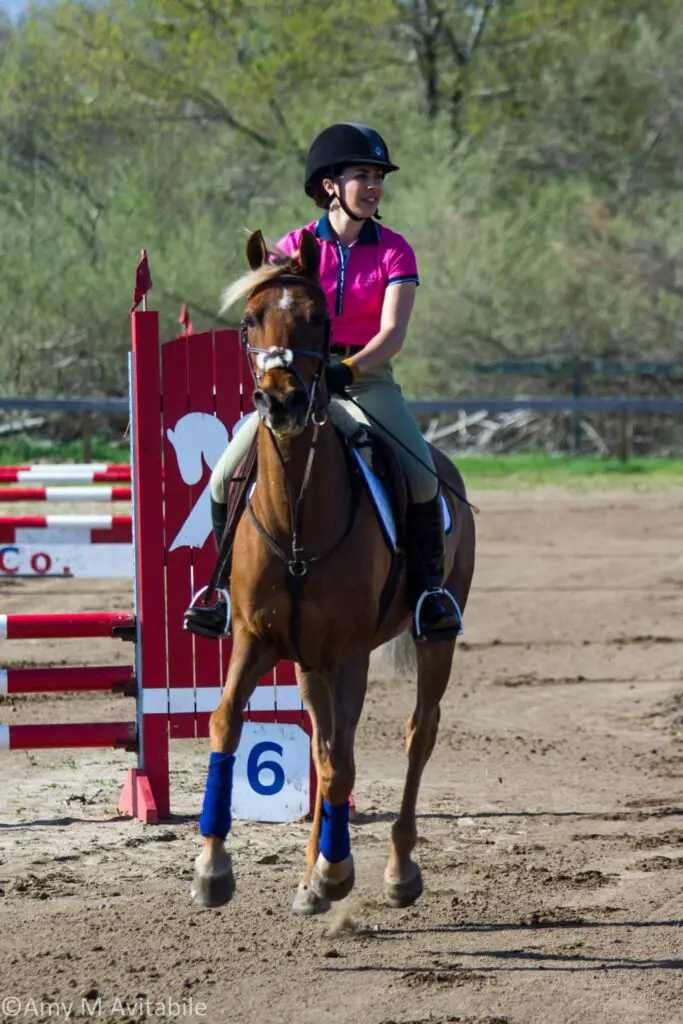
Pre-Purchase Exam
Once tried some horses and decided you like one, the next step is to have your veterinarian conduct a pre-purchase exam.
Buying your first horse is a life changing experience and can be intimidating and exciting at the same time!
A pre-purchase exam is important because it will determine if the horse has any health issues that you need to be aware of. You may uncover a serious issue that will prevent you from buying a horse that won’t be able to perform. Or, more commonly, you’ll find out what type of care and maintenance the horse requires so you can give him the best!
What If It Doesn’t Work Out?
Sometimes things just do not work out as we plan. Here’s Brooke’s advice on what to do if you find yourself in this situation.
Even if your new horse checked all the boxes, you might discover after a few months of ownership that you and your new equine partner, just aren’t a good match.
If you worked with an experienced trainer, they would also keep re-sale value in the back of their mind. This might be a worst-case scenario, but it is an important tip, be prepared to trust your trainer in these circumstances.
“I had an experience once with a difficult client that purchased a horse that I wasn’t crazy about. It was a pretty gelding and thankfully the owner had offered to give us a 2-week trial. Although he was well behaved and quiet when we initially tried him, upon arrival at our farm the horse didn’t settle in well. When I rode him, I quickly realized he was a bad match, he was too sensitive for the novice rider and exhibited signs of spookiness that concerned me. I was very honest with the client and explained my opinion that we should probably send him back. The client refused and was very stubborn and argumentative, insisting I was being unfair. His disposition didn’t improve and approximately 6 months later, the client fell off and broke a few bones- something that could have been avoided.“
People get very attached, but sometimes it’s in the best interest for both you, and the horse to find a home more suited for the horse’s temperament. Holding on to the wrong match, can be dangerous, and could lead to a miserable life for the horse and many unhappy rides for you, the owner.
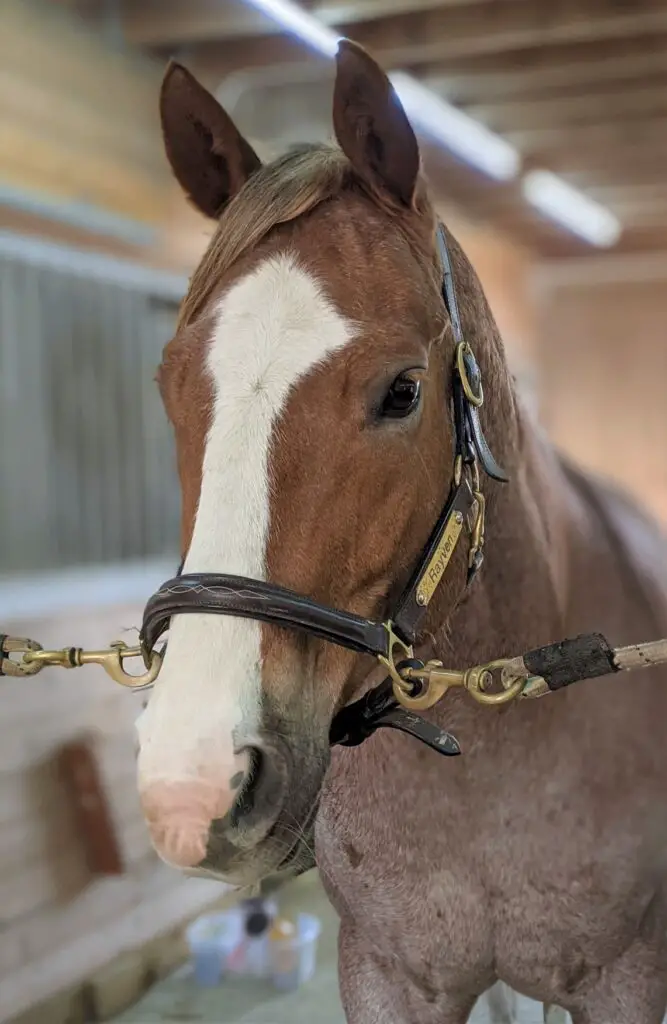
I hope you find this guide helpful! Please share and comment or send me an email with your experiences, thoughts and questions!
